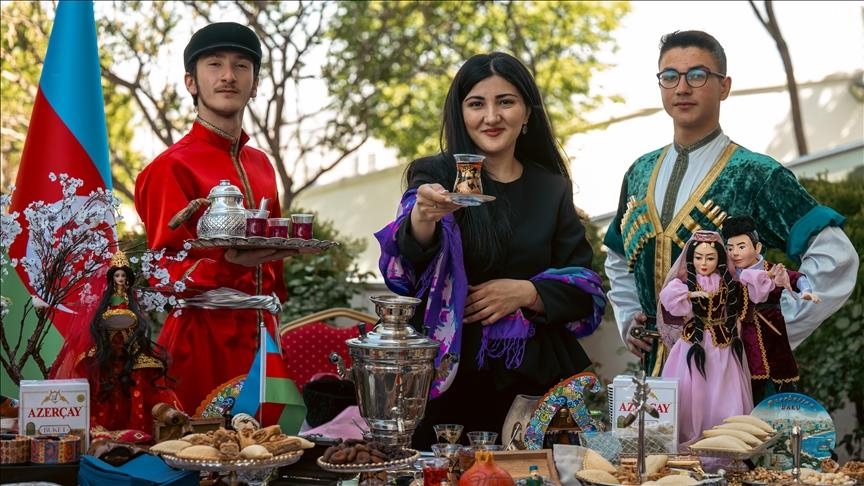Tea journey in Asia and Pacific celebrated in Ankara on International Tea Day
Cultural gathering at Saudi Embassy residence brings together 21 countries from Asia and Pacific region

ANKARA
Saudi Arabian Ambassador to Türkiye Fahad bin Assaad Abu al-Nasr and his wife Rana Abdullah Bahamdan, who also serves as chair of the Ankara Asia-Pacific Group, hosted a cultural event titled Tea Journey in Asia and the Pacific on Wednesday to mark International Tea Day on May 21.
The event, which showcased local teas and foods from various countries, was attended by Turkish Deputy Foreign Minister Zeki Levent Gumrukcu, The Ministry of Foreign Affairs Spouses' Solidarity Association (DMEDD) President Simay Gumrukcu, diplomatic mission representatives, senior officials, and distinguished guests.

In her opening speech, Bahamdan described the event as a vibrant celebration of culture, heritage, and friendship through the tradition of tea. She emphasized that International Tea Day is a great opportunity to come together and reflect on the cultural significance of tea.
She pointed out that tea has different stories and rituals in different countries, and it represents hospitality, healing, and community—traditions passed down through generations.

DMEDD President Gumrukcu also noted that tea is the world's second most consumed beverage after water, with a 5,000-year history.
She pointed out that each country has its own distinct tea culture.

Meaningful conversation begins with tea
“Tea is a welcoming gesture, a social glue, and often the start of meaningful conversation. It is a symbol of comfort and well-being, found across literature, art, and music,” she said.
She highlighted that, in addition to its cultural role, the tea industry employs over 13 million people, the majority of whom are women, strengthens rural economies, and empowers communities in developing countries.

Gumrukcu emphasized the importance of tea production in reducing poverty and ensuring food security.
She noted that tea is an important part of Turkish daily life and is proud that this tradition brings people together.
Gumrukcu told Anadolu that DMEDD has been honored to take part in promoting Türkiye’s tea culture.

She described tea as a common language and a beautiful form of intercultural interaction.
“It is something that originated in Central Asia and China and has spread across distant geographies. In our own culture, it is something we cannot do without,” she added.
She also shared that DMEDD, founded 45 years ago to support the families of diplomats martyred in service abroad, organizes activities in Ankara to promote Turkish traditions and culture, especially for foreign mission representatives.

Tea is our life
Runa Mahzabeen Ahmed, the wife of Bangladesh’s Ambassador to Ankara M. Amanul Haq, told Anadolu that tea is “our life.”

Ahmed underlined the importance of tea in their daily lives and said tea festivals are highly prestigious in their culture. In most Asian countries, she noted that tea is the first offering to guests.
She added that Bangladesh is one of the world's top 10 tea-producing countries, citing a survey indicating that Bangladeshis consume approximately 142 million cups of tea per day.

Tea journey in Asia and Pacifiic
The cultural gathering, held at the Saudi Embassy residence in Ankara, brought together 21 countries from the Asia and the Pacific region.
Each country established a national tea pavilion where visitors could experience authentic tea rituals, traditional brewing methods, and centuries-old flavors.
The program also included tea brewing demonstrations, cultural performances, and interactive workshops, making it a rich and engaging experience for all attendees.









